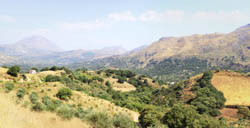Responses to land degradation and desertification
Land and ecosystem degradation and desertification (LEDD) occurs when resource-exploiting human activities, driven by economic, socio-cultural and institutional forces, degrade land resources under adverse biophysical conditions. If left uncontrolled, degradation/desertification causes decline of ecosystem services and unwanted socio-economic impacts that hamper the achievement of sustainable development and increase the vulnerability of affected regions. Human responses to LEDD are planned and/or unplanned actions which purport to either directly combat LEDD and/or address other socio-economic problems. The EU-funded LEDDRA(opens in new window) (Land and ecosystem degradation and desertification: assessing the fit of responses) project aimed to develop a comprehensive framework to analyse the socio-ecological fit of human responses to LEDD. LEDDRA introduced the notion of the ꞌresponse assemblageꞌ (RA) denoting the dynamic, multi-level, two-way relationship between LEDD and responses to LEDD within their biophysical, socio-cultural and institutional context. Optimal RAs (ORA) comprise mutually supportive, complementary and coordinated response measures that are fit to the environmental and socio-economic conditions of affected regions in the sense that they preserve their socio-ecological resilience. This means that they produce beneficial and avert detrimental environmental and socio-economic impacts. LEDDRA produced a holistic conceptual framework to guide the study of the socio-ecological fit of responses to LEDD in cropland, grazing land and forest settings. It also developed a comprehensive theory of responses to LEDD and an integrated methodology and pertinent assessment methods/techniques to assess the socio-ecological fit of responses to LEDD and to design ORAs. In addition, LEDDRA produced ten Study Site Applications (Italy, Greece, Spain, China, Morocco) and an analysis of international, EU and national environmental and development policies. It also conducted an evaluation of their implementation at the 10 study sites and policy recommendations towards the goal of combatting LEDD. The LEDDRA research findings contribute significantly to the sustainable management of land resources, rational land use planning in affected areas and policy making at the international (UNCCD), EU and the national level.




